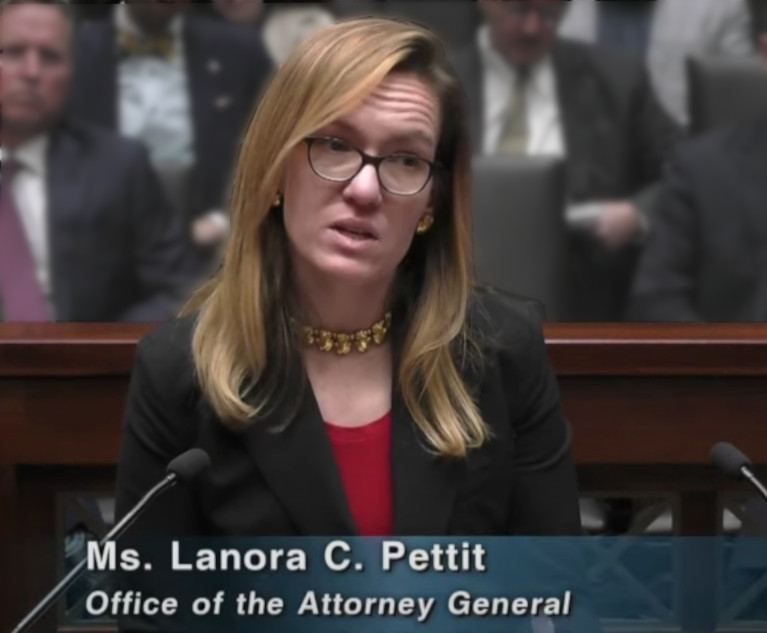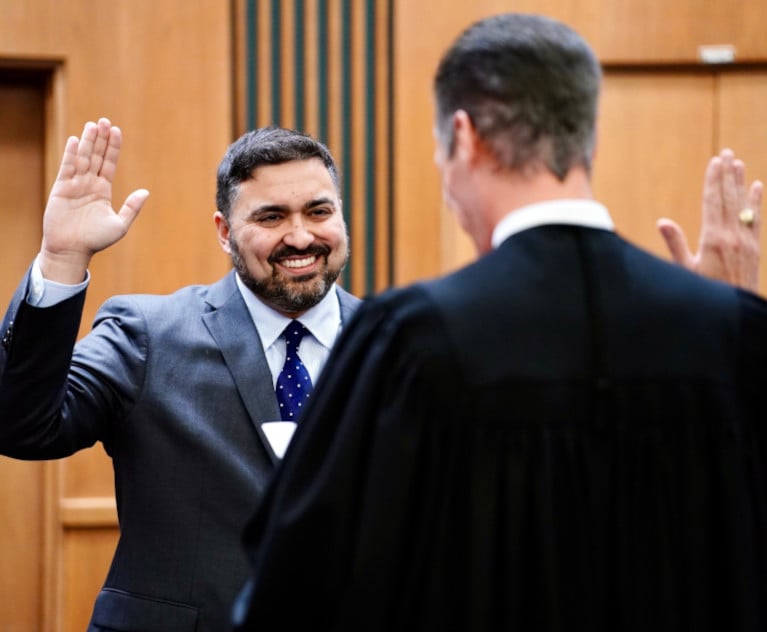Houston Lawyer Fighting Denial of Wrongful Imprisonment Compensation for Innocent Client
In a letter on Monday, Leonard Higgins of the comptroller's judiciary section wrote that he couldn't approve the compensation because of a problem with the documentation in Alfred Dewayne Brown's application.
June 26, 2019 at 11:32 AM
4 minute read
 Photo: ANURAK PONGPATIMET/Shutterstock.com
Photo: ANURAK PONGPATIMET/Shutterstock.com
Susman Godfrey managing partner Neal Manne plans to keep fighting after the Texas Comptroller of Public Accounts denied state compensation for his pro bono client's wrongful conviction.
Manne since 2015 has sought state compensation under the Tim Cole Act for Alfred Dewayne Brown, a Houston man recently declared actually innocent in the 2003 murder of a police officer, and who was wrongfully imprisoned for 12 years—nine on death row.
In a letter on Monday, Leonard Higgins of the comptroller's judiciary section wrote that he couldn't approve the compensation because of a problem with the documentation in Brown's application. The comptroller must base its decision on certain types of verified court documents, one of which is a motion to dismiss based on actual innocence, explained Higgins.
“It is not clear that the district court has jurisdiction to withdraw and reenter a dismissal, or enter a second dismissal in Mr. Brown's case. Consequently, the amended motion to dismiss and the order of dismissal do not clearly indicate on their face that Mr. Brown is entitled to compensation,” Higgins wrote in his letter that denied Brown's compensation.
 Alfred Dewayne Brown
Alfred Dewayne BrownBrown's actual innocence finding followed a rare procedure. It started when the Texas Court of Criminal Appeals in 2015 granted habeas corpus relief and ordered a new trial based on prosecutorial misconduct. The Harris County District Attorney's Office in 2015 moved to dismiss the case—but not for actual innocence. Later, the district attorney's office brought in Special Prosecutor John Raley to investigate if Brown should be reindicted or declared actually innocent. Raley issued a 185-page report that found no credible evidence to implicate Brown, and in fact, found strong evidence supporting Brown's alibi. Next, 351st District Judge George Powell reopened Brown's case in order to issue a new motion to dismiss based on actual innocence.
Texas Lawyer spoke with Manne to learn his thoughts about the comptroller's decision. Here are his answers, edited for clarity and brevity.
 Neal Manne of Susman Godfrey. Courtesy photo.
Neal Manne of Susman Godfrey. Courtesy photo.Legally speaking, why do you think the decision is wrong?
Under the law of the state, set forth by the Texas Supreme Court, the comptroller's function is ministerial only. Here, the comptroller is making judgments about who is right and who is wrong. That's exactly what the Texas Supreme Court has said the comptroller may not do. Mr. Brown has been declared actually innocent by a court, and that is all that's required under the statute for compensation. It's not the comptroller's job to pick and choose which actually innocent people get compensated, and which actually innocent people do not.
Can you briefly explain any similar cases that laid precedent for what you argue should have happened instead?
There are at least two cases that I'm aware of where an initial dismissal did not include the magic words “actual innocence,” but a district attorney, and later a district court, recognized actual innocence and a second order was issued. In each of those cases, no one questioned whether the court had jurisdiction or whether the subsequent order was sufficient to trigger the Tim Cole Act. The most recent example is the case of Hannah Overton. On exactly the same facts in which compensation has been denied to Mr. Brown, the comptroller paid compensation to her without any question.
Related stories:
Susman Godfrey Partner Wants Texas to Pay $973K to Wrongfully Imprisoned Client
2 Houston Civil Litigators Go Outside the Box to Win 'Actual Innocence' Case
Houston Ex-Prosecutor Faces Grievance for Allegedly Helping Send Innocent Man to Death Row
This content has been archived. It is available through our partners, LexisNexis® and Bloomberg Law.
To view this content, please continue to their sites.
Not a Lexis Subscriber?
Subscribe Now
Not a Bloomberg Law Subscriber?
Subscribe Now
NOT FOR REPRINT
© 2025 ALM Global, LLC, All Rights Reserved. Request academic re-use from www.copyright.com. All other uses, submit a request to [email protected]. For more information visit Asset & Logo Licensing.
You Might Like
View All


Trending Stories
- 1Data Breaches in UK Legal Sector Surge, According to ICO Data
- 2PayPal Faces New Round of Claims; This Time Alleging Its 'Honey' Browser Extension Cheated Consumers
- 3Fired NLRB Member Seeks Reinstatement, Challenges President's Removal Power
- 4NY Inspector General Announces Attorneys Hired to Lead Upstate Region and Gaming
- 5Carol-Lisa Phillips to Rise to Broward Chief Judge as Jack Tuter Weighs Next Move
Who Got The Work
J. Brugh Lower of Gibbons has entered an appearance for industrial equipment supplier Devco Corporation in a pending trademark infringement lawsuit. The suit, accusing the defendant of selling knock-off Graco products, was filed Dec. 18 in New Jersey District Court by Rivkin Radler on behalf of Graco Inc. and Graco Minnesota. The case, assigned to U.S. District Judge Zahid N. Quraishi, is 3:24-cv-11294, Graco Inc. et al v. Devco Corporation.
Who Got The Work
Rebecca Maller-Stein and Kent A. Yalowitz of Arnold & Porter Kaye Scholer have entered their appearances for Hanaco Venture Capital and its executives, Lior Prosor and David Frankel, in a pending securities lawsuit. The action, filed on Dec. 24 in New York Southern District Court by Zell, Aron & Co. on behalf of Goldeneye Advisors, accuses the defendants of negligently and fraudulently managing the plaintiff's $1 million investment. The case, assigned to U.S. District Judge Vernon S. Broderick, is 1:24-cv-09918, Goldeneye Advisors, LLC v. Hanaco Venture Capital, Ltd. et al.
Who Got The Work
Attorneys from A&O Shearman has stepped in as defense counsel for Toronto-Dominion Bank and other defendants in a pending securities class action. The suit, filed Dec. 11 in New York Southern District Court by Bleichmar Fonti & Auld, accuses the defendants of concealing the bank's 'pervasive' deficiencies in regards to its compliance with the Bank Secrecy Act and the quality of its anti-money laundering controls. The case, assigned to U.S. District Judge Arun Subramanian, is 1:24-cv-09445, Gonzalez v. The Toronto-Dominion Bank et al.
Who Got The Work
Crown Castle International, a Pennsylvania company providing shared communications infrastructure, has turned to Luke D. Wolf of Gordon Rees Scully Mansukhani to fend off a pending breach-of-contract lawsuit. The court action, filed Nov. 25 in Michigan Eastern District Court by Hooper Hathaway PC on behalf of The Town Residences LLC, accuses Crown Castle of failing to transfer approximately $30,000 in utility payments from T-Mobile in breach of a roof-top lease and assignment agreement. The case, assigned to U.S. District Judge Susan K. Declercq, is 2:24-cv-13131, The Town Residences LLC v. T-Mobile US, Inc. et al.
Who Got The Work
Wilfred P. Coronato and Daniel M. Schwartz of McCarter & English have stepped in as defense counsel to Electrolux Home Products Inc. in a pending product liability lawsuit. The court action, filed Nov. 26 in New York Eastern District Court by Poulos Lopiccolo PC and Nagel Rice LLP on behalf of David Stern, alleges that the defendant's refrigerators’ drawers and shelving repeatedly break and fall apart within months after purchase. The case, assigned to U.S. District Judge Joan M. Azrack, is 2:24-cv-08204, Stern v. Electrolux Home Products, Inc.
Featured Firms
Law Offices of Gary Martin Hays & Associates, P.C.
(470) 294-1674
Law Offices of Mark E. Salomone
(857) 444-6468
Smith & Hassler
(713) 739-1250







